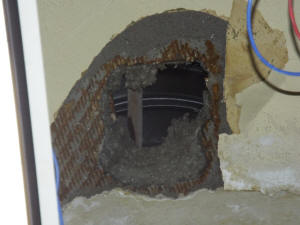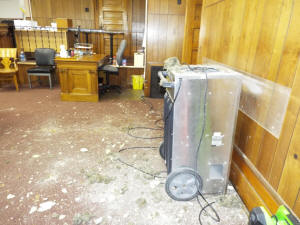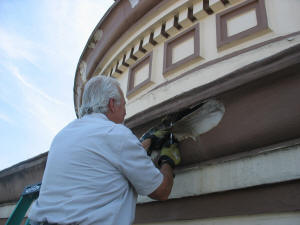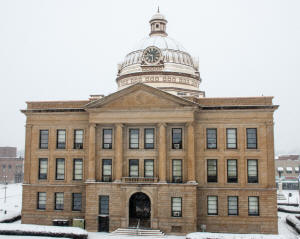|
Logan County Courthouse dome
deterioration concerns grow
 Send a link to a friend
Send a link to a friend
 [October 25, 2019] [October 25, 2019]
On Wednesday, October 23, the Logan County Board held a special
meeting to hear from restoration specialist Bill Walter of Masonry
Restoration Technologies & Services (MRTS) about the current
condition of the dome and the impact of doing or not doing something
now to mitigate problems.
Walter has done numerous inspections on the dome to evaluate the
current conditions presented along with other professional partners
to determine the optimum long-term solution as well as what
mitigating action can be undertaken to best meet the county’s
current needs.
Presently, Walter has expressed concerns regarding the amount of
time that has passed without taking corrective action. Ongoing
deterioration of the dome’s exterior roofing materials over the
years has allowed water to penetrate the interior portion of the
dome at a compounding rate.


The interior cementitious properties absorb rather than repel water.
When water absorption occurs the weight of the cementitious material
increases, and its adhesive stability is weakened. The condition is
worsened by the evidence of water in between roofing systems.
Recently, this water was released when Walter made an incision in
the dome.
Walter said that a coating was applied to the fiberglass in the past
10 or 12 years, but over time has deteriorated to the point where it
is now trapping and accumulating water, and that water has a direct
route in but not out. Action must be taken to enable evaporation and
drainage to reduce and or eliminate this problem.
The problem will not stop or reverse itself unless steps are taken
on the outside.

Freezing can cause expansion in the dome materials creating larger
and larger voids each time.

Walter said there are also significant imperfections in the copper
such as seam separation and splits and copper can be compromised by
elements that eat into it.
Holes let water underneath it, but spray on the cementitious
material prevents condensation from accumulating.
Walter said he sees the need to stop water from getting in to
prevent sections of concrete from falling. Building scaffolding and
wrapping plastic around it would encapsulate the dome and keep water
from coming inside. More water could cause more falling and
postponing the repair could cause more problems after it freezes.
The structure appears fine and Walter said there is not steel
corrosion or a concrete problem. The dome is losing pieces when it
encounters moisture, but the fiberglass is not a structural issue.
Walter said something should be done because the concrete needs to
stay dry.
Walter’s current recommendation is encapsulating the dome and the
cost of that can be associated with repairs that need to be made.
November 1 is almost here, and the climate could go south soon.
Water, ice and snow could further the damage already done, so
waiting for a referendum or other finances is not a good option.
Though other recommendations may cost less, Walter they have little
to do with the repairs. For instance, netting to catch falling
debris would go away when the restoration starts.
Walter’s focus is to restore the courthouse, and this is part of it,
but he said doing something to the dome needs to happen sooner
rather than later. He said problems will continue if the issue is
not mitigated, not having any money got us where we are.
Other options were then discussed and are being evaluated by Walter
and his team.

There were questions from board members and community members about
encapsulation as part of the restoration process how to pay for
encapsulation, whether scaffolding was figured into the costs,
whether the referendum would pay off the repairs, and the options of
starting work from the inside.
Walter said encapsulation would be done in a way that people could
work on the dome in rain and snow. The wrap would stay up through
restoration time to protect everyone from the elements.
If the project goes forward, board member Chuck Ruben said the wrap
or scaffolding would be of use. If the referendum does not pass,
Ruben said we may not be able to do it because the county does not
have money for encapsulation.
Walter asked if they could afford to not do anything, and he said
his job is to tell the board what is wrong and what is needed.
[to top of second column] |


Melanie Blankenship asked about the possibility of getting a bond,
but Ruben said the county needs a stream of money to pay for the
bonds.
If the bond fails, Ruben said the county would not have the money,
and then the amount goes on property taxes.
If the referendum passes, community member Wanda Rohlfs asked if it
would be enough to pay off repairs, how the county would pay for the
courthouse restoration, and since it will not take 20 years, whether
there are other sources if the referendum does not pass. She also
asked whether the other courthouses Walter has worked on have
additional revenue streams. Rohlfs said the courthouse is an
historically significant building and if there is no money to
restore it, it may sit and deteriorate.

The referendum would possibly provide $900,000 or more revenue each
year to pay the bond and Ruben said $12 million could be borrowed.
The county has used up the money in the major criminal case fund,
the airport and farm fund and all other budgets.
Walter said board administrative assistant Brenda Clark is working
on grants that could bring in some supplementary money.
Walter said other courthouses had revenue streams and the Energy
Conservation Grant could be substantial. He should know about that
one before Thanksgiving.
Building and Grounds Chairman Dave Blankenship said it is premature
to get credit until the board decides what kind of restoration to
do, then they can go heavy after financing.
Earlier this year the board contacted State Representative Tim
Butler and Senator Bill Brady about the courthouse roof and dome
needs. The county then applied for funding from the state of
Illinois’ new Capital Bill that is intended to aid communities with
infrastructure.
Even if granted state funds, the county is still required to supply
a significant portion of the dollars needed for the project. If the
referendum does not pass, Blankenship is concerned the county may
lose out on the capital funds also, the grant may not apply to just
a partial restoration of the facility.
Furthermore, looking at timing of availability of funds if the
referendum does pass and the county does get the capital grant, if
received the state capital projects money would go into a holding
fund, and the county or its representative would not have access to
it for a year.
Going back to if the referendum passes and that funding, Ruben said,
it takes a while to get the money, the county would just collect the
money for five months next year. The county would possibly not do a
bond until 2021, unless they can wait to start paying it.

Community member George Menken said fiberglass will crack when it
freezes and expands causing a continuous influx of water. Not
sealing the dome will just bring in more water and just keep
cracking it. He asked, “Do we tear down the building or fix it? The
longer we let it go, someone could get hurt and sue the county for
negligence.”
Menken told the board they should push the public to vote for the
referendum and if the vote is a no, everyone in the courthouse may
have to move to other locations. The county would have to spend much
more for another courthouse, so you should just understand the risk
you are taking, he said.
Rohlfs asked how much it would cost to take the courthouse down and
displace workers. Walter said it would cost $1.5 to $2 million to
tear down and same to move.
Though no decisions were made, the board is continuing its
evaluation.
[Angela Reiners]
October 2019 -
LOGAN COUNTY COURTHOUSE DOME RAISES GREAT
CONCERNS
September 2019
-
Logan County seeks to mesh new videoconference
installation with courthouse restoration
August 2019 -
Logan County Board votes to put Public
Facilities Tax referendum on the March ballot
July 2019 -
Logan County Board wrestles through funding $5
M courthouse repairs
May 2019 -
Building restoration specialist advises to
save deteriorating Logan County Courthouse dome
Bill Walter Biography - Pdf
Jun 29, 2019 -
Pritzker signs historic Bipartisan $45 billion
Rebuild Illinois Capital Plan
“With this
historic $45 billion capital plan, we’re fixing decades-long
problems, creating good jobs, improving communities for the next
generation – and doing it together, across party lines,” said Gov.
JB Pritzker. “The Rebuild Illinois plan transforms our state’s
approach to transportation infrastructure, finally treating our
roads, bridges, and railways like 21st century investments and not
relics of the past."
"The Illinois Capital bill will not only enrich the lives of
construction workers throughout our state by providing consistent
good paying jobs, but will also enrich the lives of all the
residents of Illinois through safer roads and more functional
efficient state and municipal buildings for use by the citizens of
this great state,” said John Spiros Jr., Business Manager /
Secretary-Treasurer of Painters District Council 14." |